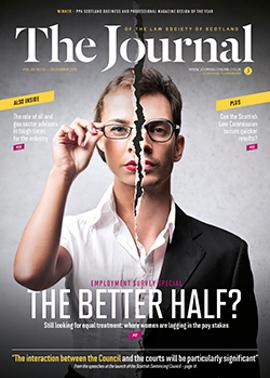Dealing with mistakes as a trainee solicitor
Daniel Defoe was probably the first writer to say that the only two things in life that are inevitable are death and taxes – it has been uttered many times, in many different ways since. A third inevitability would be mistakes.
Everyone makes mistakes. It’s an uncomfortable thing to admit. We all like to think of ourselves as polished professionals who sail through life but, well, not always.
As a trainee, you are in a new environment and learning every day. You are often involved in entirely new situations. Legal issues are rarely neat. The day is busy. People are demanding. Things go awry. Mistakes occur. Of course we should try to mitigate them from happening or limit their impact when they do, but let’s not deny their existence.
So it isn’t "if you make a mistake", but rather "How do you handle the situation when you do?"
The six steps to handling a mistake
First, take some advice from The Hitchhiker’s Guide to the Galaxy: don’t panic. Most of the time a mistake can be fixed. Panicking will only put you in a frame of mind less likely to deal with the mistake well.
Our Professional Practice team deal with calls from everyone – senior in-house lawyers, managing partners and – yes – trainees. They’ve noted that trainees who call to highlight errors or to discuss a way forward don’t always understand the depth of the mistake and therefore find it hard to articulate what has happened. Oftentimes, the solicitors in Professional Practice talk in general terms and try to give the trainees confidence to speak to someone.
Which leads us to the second step: as soon as possible, if you can, speak to someone more senior than you – who you trust – about the mistake. Identify exactly what went wrong, why it went wrong and how badly it went wrong. With this person you may want to consider a plan to fix the error. As a trainee, many mistakes will stem from you not understanding something or a lack of knowledge. If you don’t speak to a senior colleague then you won’t be able to understand what has gone wrong and you will have no real idea how to fix it.
The second step really depends on the size of your team/office. It may be that the person you report to is your partner and that there are no other people to speak to or that the matter is so urgent that a slight delay would cause more problems.
Thirdly, approach the partner (or equivalent) in a direct way and explain exactly what happened. Own up to the mistake. Don’t look for excuses. Never – ever! – try to cover it up. The best way is to just admit "This is what has happened. This is how I think we can fix it." In the competitive world we live and work in it is understandable that some may feel they will harm their future prospects by owning up. It is far, far more likely to cause you harm if you do not own up – even if that doesn’t seem to be the case in the throes of the situation.
Fourthly, fix it. Assuming the partner allows you to do so, fix it. If they do not, and want to take over, then that’s their call.
Fifthly, apologise. Be clear, straightforward and direct. And only do it once. Once you’ve apologised, you’ve apologised. There’s no point bringing it up again and again. Use it as an opportunity to show you can fix things, be proactive and work well under pressure and that you understand accountability.
Sixthly, don’t make the same mistake again. You’ll make other mistakes (we all do), but making the same mistakes over and over again suggests you aren’t learning. Move on. Soon enough everyone else will have forgotten. In the fullness of time it will become a war story.
Remember you are a trainee. You are training and learning. Learning isn’t – or shouldn’t be – just about attending lectures or seminars on black letter law. It’s about the stuff you do every single day of your traineeship. Learning only really comes about though when you reflect on your practice – think about what you’ve learned, think about how you would do things differently next time. When you make a mistake consider: Why did it occur? What steps you could have taken to prevent it from happening? Could you have handled the aftermath better?
In this issue
- Dealing with mistakes as a trainee solicitor
- Landlords: police or prisoners?
- The evolving duty of trust and confidence
- The nobile officium: still relevant, still useful
- Reading for pleasure
- Opinion: Davinia Cowden
- Book reviews
- Profile
- President's column
- One year on
- People on the move
- Equal with whom?
- Sentences by the book
- Weathering the storm
- Law reform: securing a result
- There ought to be a law
- Reform in the air
- Taking a stand against slavery
- Where the bill falls short
- IP disputes and the corporate veil
- Bar reports no more
- Dutee Chand – a marathon for a sprinter
- Scottish Solicitors Discipline Tribunal
- Advance notices and letters of obligation
- Another school round for YFIL
- Aileen takes up key membership role
- Criminal practice note alert
- Law reform roundup
- My time for nothing
- Mentoring: the neighbour principle
- Magic bullets
- Recognising paralegals
- Commission on a mission
- Ask Ash
- You had your say






